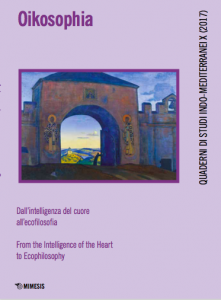ENGLISH — Why «Oikosophia», and what does this new and yet archaic word mean? Sophia in Greek means Wisdom, a knowing, or intelligence, which once used to be called “of the heart”: that is to say, an inherently relational, inborn way of being in unison with the totality of the living world, rather than the analytical approach of a discriminating intelligence that reifies. Oikos in Greek is the communal home, and this word has generated the prefix of both «eco-logy» and «eco-nomy».
This collection of essays argues that, in order to regain a meaningful connection to our “communal home”, just “caring for the environment” is simply not enough: rather, we need to recover the vision and inner presence that allows us to feel, and to inwardly know, how radically we belong to this home of ours. The wisdom necessary to achieve such a sense of interbeing —our only true being, in fact — is now urgently calling upon us, yet it comes from afar. From ancient Egypt to the Hermetic, Pythagorean, Presocratic, mysteric, Neoplatonic wisdom traditions, the vestiges of this knowing are traceable all along the history of the Indo-mediterranean world.
During the first half of the twentieth century people such as G.R.S. Mead, C. G. Jung, R. Schwaller de Lubicz, and H. Corbin clearly saw, and proclaimed, that without a reclaiming of the Intelligence of the Heart there is no future for humanity, nor for our communal home. They therefore promoted the need for an epistemological shift in our perception of reality. Today, indigenous traditions weave this same ancestral message into the ecological discourse, with the same goal of endowing environmentalism with its necessary wisdom-based foundations; hence, their voice too has been included in these pages. In the words of David Abram, one of the most distinguished contributors to the present volume: «We are fully human only in contact, and conviviality, with what is not human», that is to say with the more-than-human living world. Today more than ever we and that world depend, for our survival, on the choices we are about to make. Now.
ITALIANO — Perché «Oikosophia» e cosa significa questa parola insieme nuova e arcaica? Sophia, in greco, è la Sapienza, cioè una conoscenza, o intelligenza, che un tempo veniva detta anche “del cuore”: innato modo di essere relazionale, all’unisono con il resto del mondo vivente, anziché attività analitica di un sapere che, discriminando, reifica. Oikos, in greco, è la casa comune, ed è questa parola che ha dato origine al prefisso eco- così in «eco-logia» come in «eco-nomia».
Questa raccolta di saggi vuole dire che per poter (ri)trovare un rapporto autentico con la nostra “casa comune” non basta “preoccuparsi dell’ambiente”: occorre innanzitutto (ri)trovare lo sguardo e la presenza interiori che a quella casa comune ci fanno sentire, e sapere, di appartenere in modo irrinunciabile. La sapienza necessaria a raggiungere questo interessere — che è il nostro solo e universale, unico vero interesse — ci interpella con urgenza oggi, ma non è solo di oggi: dall’antico Egitto alla sapienza ermetica, pitagorica, presocratica, misterica, neoplatonica, le tracce e il ricordo di questa gnosi si rinvengono come un sottile filo rosso lungo tutto il percorso della storia indo-mediterranea.
Nella prima metà del Novecento divennero effettive forze di cambiamento epistemologico coloro (tra i quali G.R.S. Mead, C. G. Jung, R. Schwaller de Lubicz, Henry Corbin) che videro, e preannunciarono, come non vi sia futuro per l’umanità o per la casa comune senza un ritorno dell’Intelligenza del Cuore. Oggi le tradizioni indigene intessono nel discorso ecologico questo identico messaggio ancestrale, con il medesimo intento di dare all’ambientalismo il suo necessario fondamento sapienziale; pertanto, anche la loro voce è stata inclusa in queste pagine. Nelle parole di uno dei più eminenti contributori al volume, David Abram: «Siamo pienamente umani solo in contatto, e convivialità, con il non-umano», e cioè con il mondo vivente più-che-umano, che oggi più che mai dipende, come noi, dalle nostre scelte di adesso per la sua stessa sopravvivenza.
